
Stages of Cancer- How to detect early.pptx
- 1. Stages of Cancer- How to detect early?
- 2. Detect cancer in its early stages to improve your chances of survival. Cancer is not an easy disease to fight, but if you catch it early on then treatment can be effective. You should know the different stages of cancer and what signs may indicate that your body has been affected by this terrible condition. Recently, Dr. Kanury Rao’s research has led him to develop a novel technology for early-stage cancer detection that could allow doctors to catch the disease at its most susceptible stage! This blog will provide us insights about the various stages of cancer and how they can be detected early. If detected early, there are chances of survival. Let me know further!
- 3. Stages of Cancer In a world where cancer is becoming the major cause of death, we must work hard to find ways to prevent it. Dr. Kanury Rao, an oncologist at the Indian Cancer Research Center, says that cancer is becoming more prevalent in both developed and developing countries because it’s diagnosed late when there could have been treated already. The disease of cancer can occur anytime in any part of your body. It is caused by the abnormal growth of cells in the body. Cancer can be divided into four main stages: • Stage I: The first stage of the deadly disease when the cancerous cells are still in one place of your body and have not started to spread. • Stage II: “At this stage, the cancerous cells have started to invade nearby tissues.” • Stage III: the third stage indicates that the cancer has grown and spread to nearby lymph nodes. • Stage IV: Finally, the advanced stage of cancer when the fatal disease starts spreading to other major body organs like lungs, liver and kidney.
- 4. Early detection- How is it possible? Cancer is one of the most terrifying diseases because it can strike anyone at anytime. Early detection means more time to take care your health and make peace with what’s happening in order for treatment options work best on you. Screening is a process where early stages of Cancer are detected. By Screening tests you can find cancer even before it causes symptoms. Cancer can be easily treated if detected earlier. Screening tests in Cancer include various processes: • Mammograms: Mammograms are essential tests in the fight against breast cancer because they can help find early-stage cancers that have a much better chance at being treated. All women should get mammographed every year, no matter their age! • Pap smears: The Pap smear is a screening test for cervical cancer that women should start getting at age 21 and continue receiving every three years until they are 65-years old. • Colonoscopies: The doctor will spend about 20 minutes with you during your colonoscopy. It’s important to drink plenty of water before, during and after the procedure so that it goes smoothly for everyone involved! Colonoscopies are an important screening test for colon cancer.
- 5. Other than these processes there are also several other ways of detecting cancer in the body. Paying attention to your body and being aware of changes can help you find cancer early. Some signs and symptoms of cancer • A new lump or mass in the breast or elsewhere on the body • Breast changes size and shape • Color of the nipple changes • Changes in a mole, including an increase in size, change in color, or development of new symptoms like itching or bleeding • Morning headache • Headache with vomiting sickness • Seizures • Persistent fatigue • Unexplained weight loss In case of any chronic symptoms you experience, try seeing a doctor immediately. Many conditions other than cancer can cause this list, but only medical professionals know for sure what is going on with your body.
- 6. Types of Cancers There are five types of cancer: • Carcinomas are cancers that originate in the cells that line the surfaces of organs, epithelial cells and tissues. The most common carcinomas are breast cancer, lung cancer, and colorectal cancer. • Sarcomas are cancers that develop in the connective tissues, such as muscle or fat. They can be fierce and difficult to treat because they often form blood vessels around their mass which makes them look like an infection instead of healthy tissue! • Leukemias are cancers that develop in the blood-forming cells of the bone marrow. The most common type of leukemia is acute lymphoblastic leukemia (ALL). • Lymphomas originate in the lymphocytes, a type of white blood cell. • Myelomas are cancers that originate in the plasma cells, a type of white blood cell. Multiple myeloma is the most common type of myeloma.
- 7. Conclusion The earlier cancer is detected, the higher chance there is for successful treatment and survival. Early detection can be accomplished by screening tests or paying attention to your body so you don’t miss anything. If you experience any concerning symptoms, be sure to see a doctor immediately. We hope that you have found this blog to be informative and helpful. Stay with us for more information on health-related tips! Thanks so much for reading, we really appreciate your time.
